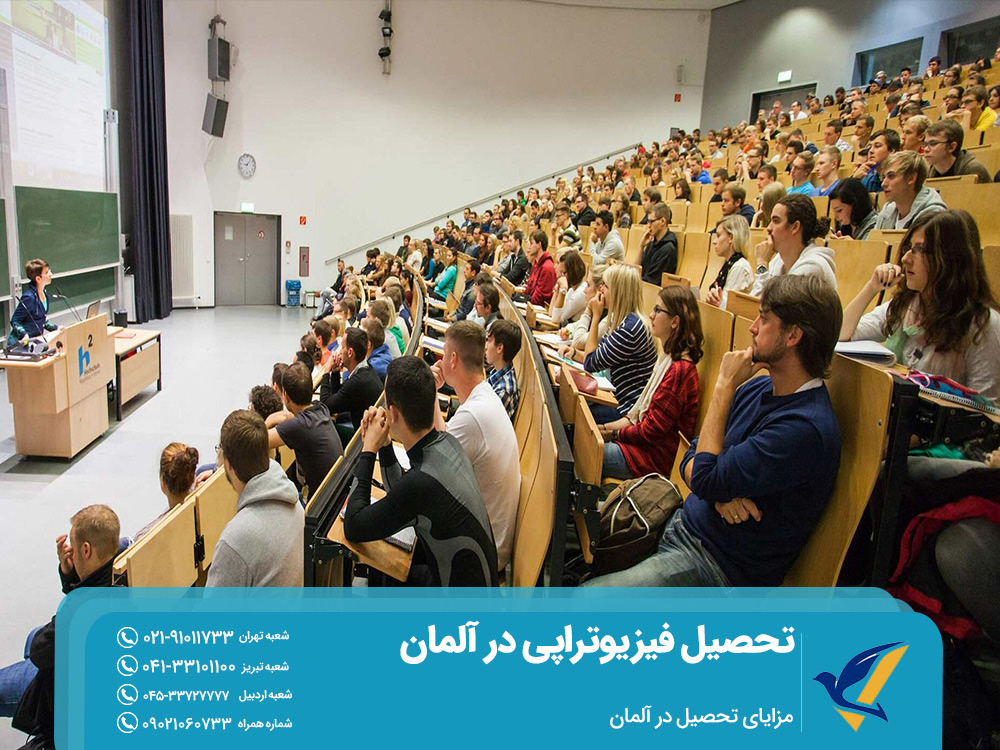Studying Physiotherapy in Germany
Studying physiotherapy in Germany has become one of the most popular options for students interested in pursuing their education abroad. This is due to the global recognition of the country’s top universities and educational institutions, the high quality of instruction offered, and the promising career prospects for graduates.
The cost of studying physiotherapy in Germany depends on the type of university. If accepted into a public university, your education will be tuition-free, and you’ll only be responsible for a minimal registration fee. Qualified applicants can also apply for scholarships that help cover part of their tuition and living expenses. In this article from the Elm Vira series, we will explain how to study physiotherapy in Germany.
Studying Physiotherapy in Germany
In recent years, the number of applicants for medical science programs abroad has significantly increased. Physiotherapy is among the most popular and in-demand fields, with many students applying for admission each year. This field uses physical methods to study disease, deformity, or injury in the human body. It involves deep knowledge of the structure and function of the body, as well as an understanding of the psychological and social aspects of health and human interaction with the environment.
Germany, with its world-renowned universities, high-quality education, and low tuition fees, offers a wide range of services to international students and aims to train a new generation of top physiotherapists. Physiotherapy programs in Germany are available at all academic levels. Graduates are generally required to complete 64 course credits. Some of the core subjects in physiotherapy include:
-
Anatomy
-
Physiology
-
Pathophysiology
-
Hygiene
-
First Aid and Bandaging
-
Applied Physics and Biomechanics
-
Application of Learned Principles
-
Basics of Sociology and Rehabilitation Theory
-
Education Theory and Retraining in Movement and Mobility
-
Physiotherapeutic Treatment Techniques
-
Massage Therapy and Electrotherapy
-
Hydrotherapy, Balneotherapy, Heat Therapy, and more
-
Clinical Practice
Upon graduation, students will be able to apply these principles in practical and hands-on rehabilitation and treatment of patients.

Requirements for Studying Physiotherapy in Germany
To study physiotherapy in Germany, you must first gain admission to one of the country’s universities. Each university has its own specific set of rules and required documents. Once you receive your acceptance letter and comply with other regulations, pursuing education in Germany is quite manageable. The minimum requirements for admission into physiotherapy programs in Germany include the following:
1. Certificate of Completion of Previous Education
A high school diploma or equivalent is essential for applying for a bachelor’s degree in physiotherapy. After completing the undergraduate program, students can apply for a master’s degree in physiotherapy. For each level of education, presenting proof of completion of the previous degree is mandatory.
2. Language Proficiency
Language certification is another key requirement. Most physiotherapy programs in Germany are taught in German, so sufficient language skills are necessary. However, some universities offer courses in both German and English. You’ll need to submit valid language test scores to your chosen university. Accepted tests include:
- DSH (for German)
- TestDaF (for German)
- IELTS (for English)
- TOEFL (for English)
Additional Requirements
Other requirements may include passing an entrance exam or interview (depending on the university), showing proof of financial means, and completing a foundation program with good grades.
Academic Levels in Physiotherapy in Germany
Physiotherapy studies in Germany are available at all three academic levels: Bachelor’s, Master’s, and Doctorate. The conditions and duration of each program are as follows:
- Bachelor’s Degree: 3–4 years; German language proficiency at level C1
- Master’s Degree: 2 years; full command of German and C2-level proficiency required
- PhD Program: 3–4 years; requires an academic CV, work experience, and a high level of language proficiency
Each level comes with its own academic and language expectations, so thorough preparation is essential for success.

Required Documents for Studying Physiotherapy in Germany
The required documents for studying physiotherapy in Germany vary depending on the academic level (bachelor’s, master’s, or PhD) and the university you choose. Some documents are universally required for admission, while others are specific to each institution.
Each university provides detailed information about the specific requirements on its official website. It is essential to review these details carefully, as even minor omissions or mistakes in your application can affect your chances of acceptance. Below are the general documents commonly required for studying physiotherapy in Germany:
General Documents:
- Letter of Admission from a German university for the physiotherapy program
- Academic transcripts and previous diplomas (e.g., high school diploma for bachelor’s, bachelor’s degree for master’s applicants)
- Proof of university entrance qualification (completion of any required pre-university courses)
- Motivation letter (optional but recommended)
- Copies of German student visa documents and passport
- Completed visa application form
- Personal identification documents, such as national ID, marriage certificate, or child’s birth certificate (if applicable)
- Copies of previous visas (if applicable)
- Proof of accommodation in Germany (rental or purchase agreement)
- Proof of financial resources (blocked bank account or financial guarantee)
- Health insurance certificate covering your entire stay in Germany
- Academic and professional résumé (CV)
- Language certificate (German or English, depending on the language of instruction at the university)
Health Insurance Requirement:
One of the essential steps after receiving university admission is obtaining health insurance. Health insurance is mandatory for all international students in Germany. You can choose between public and private health insurance plans, depending on your needs and eligibility.
Ausbildung Programs in Physiotherapy in Germany
Participating in Ausbildung programs is another path to study physiotherapy in Germany. These are typically three-year vocational training courses that provide both theoretical knowledge and practical skills in physiotherapy. Ausbildung is especially beneficial for those seeking hands-on experience and a clear pathway into the job market after graduation.
Applicants should have strong skills in physical education, biology, and the German language to complete the coursework. These programs are designed to ensure graduates are well-prepared for the professional demands of a physiotherapist.

Studying Physiotherapy in Germany: Top Physiotherapy Universities
In recent years, international students have shown growing interest in studying physiotherapy in Germany. The country’s universities offer high-quality educational programs and state-of-the-art facilities, creating an ideal environment for academic pursuit. Below are some of the top universities in Germany for studying physiotherapy:
| Top Physiotherapy Universities in Germany |
Rank in Germany |
Rank in Europe |
Global Rank |
| Heidelberg University |
2 |
16 |
57 |
| RWTH Aachen University |
13 |
80 |
199 |
| Charité – Universitätsmedizin Berlin |
21 |
95 |
262 |
| University of Freiburg |
9 |
68 |
178 |
| University of Hamburg |
7 |
56 |
149 |
Cost of Studying Physiotherapy in Germany
Studying physiotherapy in Germany is often free of charge at public universities. Once you are admitted to a public university, you are not required to pay tuition fees—only a registration fee ranging from €150 to €350.
In contrast, tuition fees at private universities vary depending on the institution. As there are various universities and institutions across Germany, tuition costs differ. It is important to check the most up-to-date annual tuition fees of your chosen university. Generally, the cost of studying physiotherapy at private universities can range from €5,000 to €20,000 per year, depending on the university and level of study.
Although the cost of physiotherapy education in Germany is relatively low, students should also account for living expenses, which vary based on lifestyle and location. On average, international students in Germany should budget around €850 to €1,200 per month for housing, food, health insurance, transportation, and personal expenses. To help cover these costs, students are allowed to work part-time while studying.

Studying Physiotherapy in Germany: Scholarships
Germany offers various scholarships that are also available to physiotherapy students. While studying at public universities is generally free, these scholarships can significantly assist those attending private universities by helping cover tuition fees, living expenses, health insurance, travel, and more.
Some notable scholarships available for studying physiotherapy in Germany include:
- Education Future International Scholarship
- DAAD Scholarship (German Academic Exchange Service)
- German Research Foundation (DFG) Individual Research Grants
Career Prospects for Physiotherapy Graduates in Germany
According to research conducted up to 2018, around 40% of the German population requires physiotherapy due to various medical conditions. 23% of individuals in Germany receive physiotherapy services at least once a year. This high demand, combined with the low cost of education and attractive post-graduation salaries, has led to a significant increase in the number of students pursuing physiotherapy.
The career outlook for physiotherapy graduates in Germany is bright and promising. Salaries vary depending on skill level, experience, and location. Over time, with increased expertise, income levels also rise. Physiotherapists are among the well-paid professionals in Germany, with an average monthly income of €6,950. Entry-level salaries start around €3,200 per month, while experienced physiotherapists can earn up to €11,100 per month.
After graduating in physiotherapy, students in Germany can work in various settings, including:
- Public or private hospitals
- Educational institutions such as universities
- Rehabilitation centers
- Sports clubs and fitness facilities
Key areas of employment in physiotherapy include:
- Stress relief and treatment of occupational disorders like back pain and shoulder strain
- Supporting recovery for individuals with paralysis or elderly patients
- Assisting patients with vascular or metabolic conditions such as diabetes and hypertension
- Rehabilitating injured athletes
- Helping adults regain fitness and improve the function of muscles, joints, and ligaments

Advantages of Studying in Germany
Tuition fees for physiotherapy programs at public universities in Germany are very low, and even at private universities, they remain more affordable compared to tuition for medical or dental programs in other European countries. Contrary to what some may assume, despite the relatively low cost of education, the quality of teaching is exceptionally high. The numerous advantages of studying physiotherapy in Germany have attracted students from around the world. Some of the most important benefits include:
- Free Education in Germany: Tuition fees for physiotherapy in Germany vary depending on the university type. Public universities offer free education to international students of any nationality, with only registration fees (usually €150 to €350) required.
- Study in English: Some German universities offer physiotherapy programs in English, making them accessible to international students who may not be fluent in German.
- High Educational Standards in Physiotherapy: German universities bring together top professors and experienced physiotherapists to deliver cutting-edge education using the latest methods and advanced equipment.
- Practical Training and Experience: One of the key benefits of studying physiotherapy in Germany is the emphasis on hands-on training. Both university programs and Ausbildung (vocational training) courses provide practical education that enhances students’ skills and prepares them for the job market.
- Bright Career Prospects and High Income: Given the increasing global demand for physiotherapists, obtaining a physiotherapy degree from a German university opens doors to employment opportunities worldwide. The profession is also known for its high income compared to many other fields.
Conclusion
Studying physiotherapy in Germany has become increasingly popular due to the combination of affordable education and excellent career opportunities. Germany is one of the few countries where public university education is free, and this benefit is available not just to German students but to international as well. For physiotherapy programs at public universities, there are no tuition fees, only minimal registration charges.
By studying in Germany, students gain access to the most up-to-date educational methods at some of the country’s top universities. The degrees awarded are highly respected internationally, allowing graduates to work as physiotherapists anywhere in the world. If you’re considering studying abroad but are unsure about which country or program to choose, you can consult with our advisors at Elm Vira. Visit the Free Consultation section to learn more about studying abroad and get the information you need.
میانگین امتیازات 5 از 5
Vote count: 1 Vote